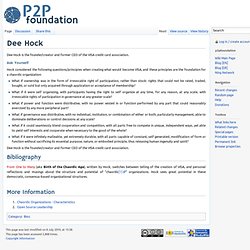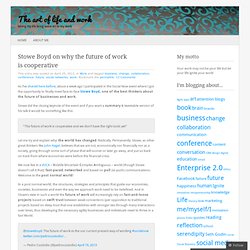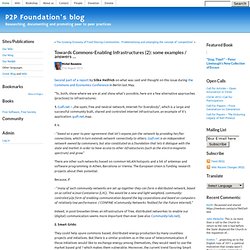

Global Startup Platform / Useful Links and Resources. Entrepreneurship Corner: Stanford University's free podcasts and.
JSB at Stanford: "Collaborative Innovation and a Pull Economy" - Updates from the Edge. The Trillion-Dollar Vision of Dee Hock. Dee-hock-the-chaordic-organization. Dee Hock. Dee Hock is the founder/creator and former CEO of the VISA credit card association.

Ask Yourself Hock considered the following questions/principles when creating what would become VISA, and these principles are the foundation for a chaordic organization: What if ownership was in the form of irrevocable right of participation, rather than stock: rights that could not be rated, traded, bought, or sold but only acquired through application or acceptance of membership? What if it were self organizing, with participants having the right to self organize at any time, for any reason, at any scale, with irrevocable rights of participation in governance at any greater scale? What if power and function were distributive, with no power vested in or function performed by any part that could reasonably exercised by any more peripheral part? Doctor Love. Stowe Boyd on why the future of work is cooperative. As I’ve shared here before, about a week ago I participated in the Social Now event where I got the opportunity to finally meet face-to-face Stowe Boyd, one of the best thinkers about the future of businesses and work.

Stowe did the closing keynote of the event and if you want a summary & tweetable version of his talk it would be something like this: “The future of work is cooperative and we don’t have the right tools yet” Let me try and explain why: the world has changed. Radically. Permanently. We now live in a VUCA – Volatile Uncertain Complex Ambiguous – world (though Stowe doesn’t call it that): fast-paced, networked and based on pull (vs push) communications. In a post normal world, the structures, strategies and principles that guide our economies, societies, businesses and even the way we approach work need to be redefined. @stoweboyd: The future of work vs the our current present way of working #socialnow twitter.com/pedrocustodio/…— Pedro Custódio (@pedrocustodio) April 19, 2013. Towards Commons-Enabling Infrastructures (2): some examples / answers …
Second part of a report by Silke Helfrich on what was said and thought on this issue during the Commons and Economics Conference in Berlin last May.

“To, both, show where we are at and show what’s possible, here are a few alternative approaches (practices) to infrastructures: 1. Guifi.net – „the open, free and neutral network; Internet for Everybody“, which is a large and successful community built, shared and controled internet infrastructure; an example of it’s application: guifi.net.map. It is - “based on a peer to peer agreement that let’s anyone join the network by providing her/her connections, which in turn extends network connectivity to others. There are other such networks based on common WLAN hotspots and a bit of antennas and software programming in Athen, Barcelona or Vienna. Because, if - “many of such community networks are set up together they can form a distributed network, based on so called »Linux-Containers« (LXC). 2. 3.
The Social Ecosystem « Random Thoughts of a Boston-Based CTO: Jo. Nations And Networks. I was reading the NY Times today on the excellent Editors Choice App on the iPad and came across this line in a piece by Scott Shane: “We’re still focused on the nation and not the network,” said John Arquilla, professor of defense analysis at the Naval Postgraduate School.

“You can do brilliantly in Afghanistan and still not deal with the Faisal Shahzads of the world.” This is not a post about the US' strategy in its war against terrorism. I have very mixed feelings about it and don't feel that I can add anything to that debate. This is a post about nations and networks. And there are some networks that are as big as countries. These are some of the largest networks but as Professor Arquilla points out there are all sorts of networks on the Internet and some of them are dangerous. Download the book.